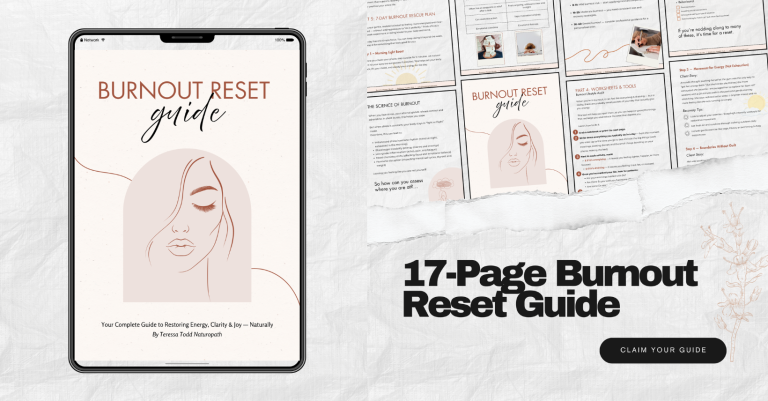It’s that time of year again — the home stretch before Christmas.
And if you’re like most women I see in clinic, you’ve been running on adrenaline since, oh… about February.
By November, I start hearing the same story from so many clients:
“I’m exhausted but I can’t stop.”
“I’m just trying to hold it together until Christmas.”
“I’ll rest over the holidays — I just have to get through the next few weeks.”
Sound familiar?
Here’s the truth — your body isn’t designed to run on empty all year.
When you’ve been juggling family, work, deadlines, and expectations for months on end, your body eventually waves the white flag.
That’s when I see it happen:
The head colds that linger.
The snappy moods.
The tears “for no reason.”
The total wipe-out that hits the moment you finally stop.
Let’s change that this year…..
Why You Feel So Worn Out by December

Your stress system is designed for short bursts of pressure — not an endless marathon.
When stress is constant, your body keeps releasing cortisol (your main stress hormone) to keep you going.
But after a while, that system gets tired too.
The result?
You feel flat, foggy, emotional and drained — even if you’ve “powered through” all year.
Your sleep gets lighter, your cravings increase, your patience shrinks… and your immune system throws in the towel.
That’s burnout in motion…….
How to Make It Through the End of the Year — Without the Crash
You don’t need a complete life overhaul — just small, science-backed tweaks to help your body shift out of survival mode and into steady energy mode.
Here’s a simple starting point — enough to ease the load right now.
For a deeper reset plan, I’ve created something special (I’ll share it below).
1. Start Your Day with Calm, Not Chaos
Before diving into the to-do list, take five quiet minutes.
Stretch. Breathe. Step outside with your morning cuppa or juice.
This signals to your nervous system that you’re beginning from balance, not stress.
Think of it as setting your inner rhythm for the day — steady and grounded.
Inside my Burnout Reset Guide, I teach a simple morning ritual that helps reset cortisol patterns in just minutes a day.
2. Work in Energy Blocks (and Take Real Breaks)
Your brain isn’t wired to run on go-mode for hours.
Work in 60–90-minute blocks, then pause — move, breathe, or change your environment.
These “mini resets” are what keep your stress hormones in check and prevent the afternoon crash.
3. Protect Your Evenings
Late-night scrolling or finishing “just one more thing” might feel productive — but it actually tells your body it’s still in work mode.
Try dimming lights, switching off screens an hour before bed, and doing something that soothes your mind — journalling, a warm shower, or reading.
When you create this rhythm nightly, you train your body to wind down naturally — improving sleep, mood, and energy the next morning.

4. Plan Recovery Into Your Week
You don’t have to wait for holidays to rest — your body needs small recovery pockets every week.
Here’s how:
- Midweek mini-reset: early night, quiet dinner, or a solo walk.
- Friday wrap-up: close your laptop and do something fun or relaxing.
- Weekend recharge: say yes to what fills you, no to what drains you.
These aren’t indulgences — they’re your maintenance plan.
In the Burnout Reset Guide, I show you how to create your own weekly rhythm that supports your nervous system, hormones and energy flow — step by step.
4. Create a “Finish-Line Plan”
Ask yourself:
- What really has to be done before Christmas?
- What can wait until next year?
- What can I let go of completely?
Then, build in at least two “slow days” before the holidays — no plans, no pressure, just time for your system to catch up.
That simple step alone can mean the difference between recovery and collapse.
Why This Works
When you add space, rhythm, and rest into your days, you’re actually retraining your nervous system — helping cortisol regulate, hormones rebalance, and energy flow evenly again.
This isn’t just about relaxation — it’s about resetting your body’s chemistry so you can finish the year feeling clear, calm, and capable.
You Don’t Have to Crawl to the Finish Line
Imagine arriving at Christmas feeling calm, present, and light — not wired, teary, or too tired to enjoy it.
That’s what happens when you support your body before it reaches breaking point.
If you’re ready to do that properly, I’ve created something to guide you — The Burnout Guide
It’s a naturopath-designed roadmap that helps you restore energy, calm your nervous system, and rebuild balance — naturally. You’ll discover the daily rhythm, nutrition, and self-care structure I use with clients to help them go from “burnt out” to brilliantly balanced.
This year, don’t just survive to the holidays.
Finish strong. Rest deeply. And step into the new year feeling like you again.
Teressa Todd
Naturopath | Biochemist
Ready to kick start Gut Health? Book a Call!

This is how gut microbes can influence weight!
Probiotics can help you gain weight or lose weight by interacting with our genetics, food and metabolism.
And yes, I did say lose or gain weight……..
Firstly, let me explain that the trillions of microbes in the gut need to be varied, meaning that there should be a large variety of species. There are many different species (or breeds) of microbes, and they all have their place in aiding health — the more variety and balance, the better health results.
Back to the weight loss or weight gain issue….
Do you eat yogurt and berries for breakfast? Thinking that it’s helping you lose weight?
Well, Lactobacillus acidophilus (like the species found in yoghurt) has been connected to weight gain.
I am not saying throw your yoghurt and berries in the bin. Instead, I am suggesting looking at the overall picture. If Lactobacillus acidophilus is the predominant micro-organism of the gut, then weight gain can result.
It is about the variety of species of gut microbes. Imagine if we only have trained german shepherd guard dogs in the world. It may be a safe world, but I am sure that other breeds may be more suitable as a family pet.
While Lactobacillus acidophilus is associated with weight gain, other Lactobacillus species correlate with weight loss.
Species like Lactobacillus plantarum, Lactobacillus gasseri, and Bifidobacteria animalis have been found to support weight loss.
Want to lose weight?
Look at your gut flora to support your goal.
Tests can be performed to identify the predominant species of the gut, and specific species can be utilised to support weight changes.
Want more information about your gut health?
Or want to look at all the factors contributing to weight gain, I’d love to be able to help.






